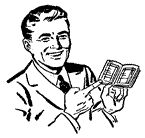Writing Basics

Most people tend to read and write on the fly. Rarely do they consider how much time and energy it saves to write with a plan. When writing in an academic setting, a plan is even more important. There are several things you need to consider when reading and writing for academic purposes.
The writer’s obligation to the reader
During the first week of class, I often ask students this question: What (if any) are the writer’s obligations to the reader? Is the writer bound to consider his or her audience, and if so, in what way? Asking this question highlights writing as a method of communication. When you’re talking on the telephone, you have some obligations to the person on the other end of the line. The same is true for writing, even if the other person doesn’t receive your communication instantly.
Here is a partial list of what students consider a writer’s obligations to the reader:

- Be clear
- Have correct grammar
- Be informative
- Be organized
- Don't ramble
- Be entertaining
- Use proper vocabulary
- Be interesting
- Be accurate
- Tell the truth
- Include details
- Nothing
At least one or two people or groups always argue that writers have no obligation to anyone but themselves. Most people who believe this argue that the word “author” implies authority or control over the work at hand, and therefore the author must listen only to the creative impulses from within.
You will no doubt have your own ideas about what a writer is or isn’t obligated to do. Consider what you would add or delete on the list. Many of you probably came to the conclusion that the extent and nature of the obligation depends on who the audience is, and what the purpose of the writing is. Even something as straightforward as a shopping list will have different forms and elements depending on who is writing, and who is reading. A shopping list written for one’s significant other will be different than one written for a child, for example. A grocery list looks different than a list of books to buy at the bookstore. Which and how many details you include, the vocabulary, spelling, abbreviations and specifications will depend on the intended audience and purpose of the list. Any given writing task will present a different set of obligations. To fulfill these obligations, you must be able to identify and prioritize them. The key to doing this lies in answering two questions:
What is my point? |
Who is my audience? |
If you accept this logic, it becomes clear that the only thing writers must do is: 1. Have something to say, and 2. Know to whom they want to say it . If you don’t accept this logic, or wish to comment or further the debate, let your feelings be known in the Extra Credit Free-for-All forum. For now, these two simple questions are the core of my expectations for the class. Having a clear answer to them primes you for any writing task, including academic writing. The rest of the essay – grammar, organization, vocabulary, format, details, clarity of language, voice and style, etc – won’t mean much if you have no answer to these questions.


As with the thesis, however, you don’t need to envision a particular audience just as you begin to write. It might be helpful to think only of yourself as the audience for the first couple of steps in the writing process. Trying to pinpoint a specific audience too early might lead to the anxiety I described earlier, or it might close off some directions worth exploring. So keep yourself and your goals flexible until it comes time to really organize and polish the writing.